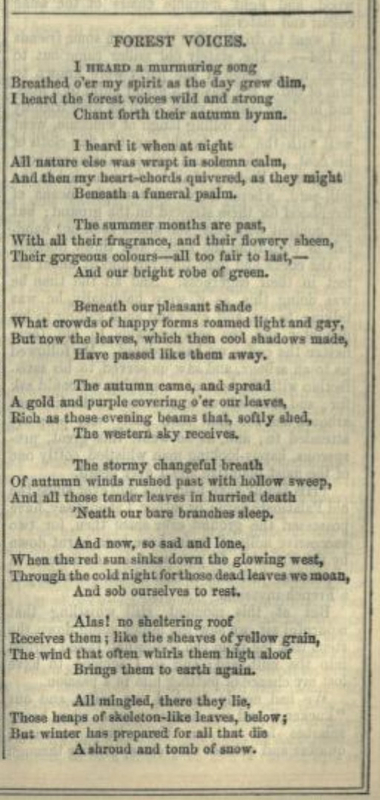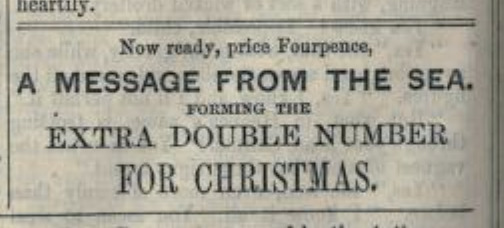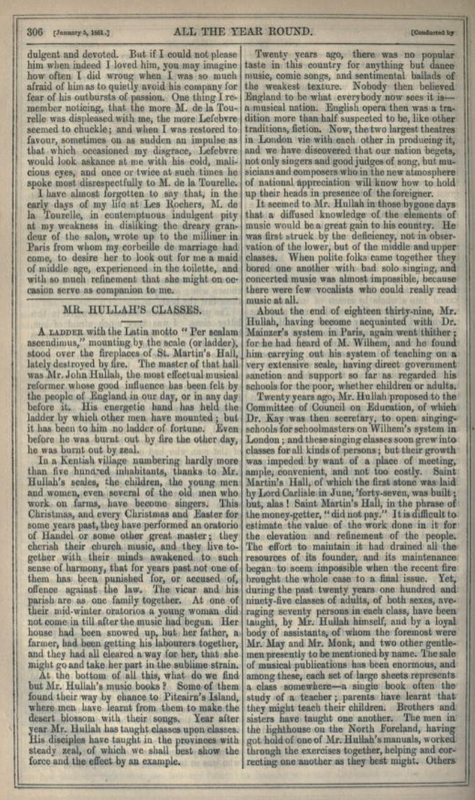Part 6
Charles Dickens, one of the most cherished and critically discussed Victorian authors, found great success in his contemporary moment and, like many authors of the time, released his work in serial form and even was the editor of his own popular periodical, “All the Year Round.” Though one can read Dickens’ work in novel form today, reading his work, Great Expectations, in its original, serial context within “All the Year Round” provides invaluable insight into the concerns of the moment and a clearer understanding of the themes within the text. In Jeanette Samyn’s review of Daniel Siegel’s book, Charity and Condescension: Victorian Literature and the Dilemmas of Philanthropy, we are told that Victorian, English society was highly concerned with good charity as “Daniel Siegel considers the Victorian period a high point for British charity. Torn between the desire to alleviate poverty and the fear of causing harm in trying to do good, he argues, Victorians took both charity and its limits seriously” (Samyn p. 284). Dickens, as a publisher and known philanthropist, was evidently also aware and concerned with the nature of charity as Siegel’s book apparently suggests:
“In [Dickens’] late period… effective charity can only exist outside of ‘the realm of authority,’ where condescension is not an issue… Later Dickens suggests that even at its most sincere, condescension works in the interest of privilege. And in this, Siegel claims, he forecasts the incipient socialism that toward the end of the century would convince Britons that charity was nothing more than ‘a palliative for the consciences of the rich’” (p. 284-285).
Dickens, in his editorial choices of publication design and the selective inclusion of other work, is trying to move his audience toward accepting a form of charity which does not include one condescending from a higher position to benefit those they consider beneath them. This can be seen in considering the editorial choices Dickens makes and how they consequently impact the themes of Great Expectations when read within its original, serial context to expose and critique the social hierarchy that produces condescending charity and alludes to a classless consideration of charitable pursuits.

Shakespeare Quote
The first editorial feature to consider is the quote displayed above from Shakespeare’s Othello: “The story of our lives from year to year” (All the Year Round p. 289). This quote immediately postures all the stories and writings within the publication as in some way belonging to and being relevant to all. The quote originates from Othello and actually reads as: “…the story of my life/From year to year…” (Shakespeare 1.3.150-151). This clear and conscious editorial change from ‘my’ to ‘our’ clearly illustrates Dickens’ desire to consider all readers and contributors on the same level by using the intentionally vague and general pronoun, ‘our,’ which forms an unrestricted and endless group of individuals that is devoid of arbitrary divisions among people by class or otherwise. Evidently, by putting this quote above the first page of every issue of this periodical, Dickens desired that there should be no hierarchal distinction between his readers that one would have to condescend to cross. In contrast to this concern evidenced by the inclusion of the quote, the section of Great Expectations within this issue of the periodical finds Pip relaying his experiences with his assumed benefactress, Miss Havisham, to his guardian sister, Mr. Pumblechook, a man who tries to take credit for all that he sees as good in Pip’s life, and Joe Gargery, his confidant and most loyal friend. Mr. Pumblechook treats Pip as an other that is beneath him and in his faux charity makes a distinct and intentional point to illustrate his condescension to Pip’s low level in order to offer his sham charity. Pumblechook speaks down to Pip constantly as seen in instances such as the following: “’Good!’ said Mr. Pumblechook conceitedly. (‘This is the way to have him! We are beginning to hold our own, I think, Mum?’)” (Dickens p. 102). Pumblechook is portrayed as a conceited, contemptable fool who seeks to make himself seem more valuable by condescending to Pip and claiming he is doing charity for one beneath him. Portraying him as obviously unlikable for these actions speaks to the themes of contemporary concern surrounding the Victorian ideas of charity and how to perform charitable acts in a more constructive and selfless way. The Shakespeare quote essentially communicates that all of the stories included in the periodical belong to and are relevant to all of ‘us’ and enhances the thematic commentary on selfish, condescending charity embodied in Mr. Pumblechook as his outlook is one of class divisions to be overcome by condescension. Dickens’ inclusion of the Othello quote is a clear attempt to frame all within the periodical as belonging to all and focused on looking beyond hierarchal divisions and frames the following chapters of Great Expectations as a critique and satire of such divisions.

Forest Voices
“Forest Voices” is an anonymously written poem from the perspective of trees in fall and winter. The speaker being trees is intriguing as this choice embraces a more universal perspective that reaches beyond humanity. The trees also express a wide and selfless concern for the leaves as the speaker expresses: “Through the cold night for those dead leaves we moan” (All the Year Round p. 299). This poem’s mourning and selfless refrain helps the reader to, again, feel a wider perspective beyond even the human experience by taking the perspective of trees and how they interact with the world around them without consideration of class but concern for all, even the leaves which literally “’Neath [their] branches sleep” (p. 299). Showing the sympathy and mourning of the loss of the seasonal leaves regardless of their dependence on or position relative to the trees exhibits a selfless and charitable concern for a large number of individuals with disregard for those individuals’ dependency or hierarchal position in relation to the trees. Further, by drawing on a common experience and offering an uncommon view of sympathy in the other-than-human works to develop that previously discussed ‘us’ into something even more universal and general. It once again hearkens to a selfless concern for those we may consider others or as beneath us and postures the chapters of Great Expectations in such a way that highlights the concern for self and status in the characters rather than selfless sympathy for others without condescension. This increases the comedy of the characters as the reader sees a moral gap which is becoming more evident between the ideal charitable perspective of all as one and the economic and class concern of the individual. The poem underscores and affects the contextual interpretation of Great Expectations by suggesting an ideal selfless sense of charity is present in the speaker trees of “Forest Voices” which is lacking in Pumblechook who looks down on those around him. The poem’s display of un-hierarchal charity also makes Pip, who tries to ascertain “the best step [he] could take towards making [himself] uncommon” (Dickens p. 107), or of a higher class in other words, look foolish and selfish as he is essentially seeking something to separate himself from those he wishes to see as beneath him. The reader is led to more deeply interpret Mr. Pumblechook and even Pip’s character as less than ideal due to their inability to see value beyond harnessing the social hierarchy.

A Message From the Sea advertisement.
The above image being the only ad in this entire issue of the periodical speaks volumes. This is a noteworthy feature as there is great profit to be made by selling space for advertisements in a widely read publication such as “All the Year Round.” It follows that making the conscious and less profitable choice to include only a single ad for nothing other than a story previously published in an earlier issue of Dickens’ periodical shows a concern for the quality of the work included, benefit to the reader, and a probable distaste for the distraction and solicitation of unneeded goods and services. This shows the reader that the publisher is more focused on giving them quality stories rather than profiting from their patronage, again reinforcing the less selfish and more community focused stories, themes and style of the publication. This makes the obsessions with finances and being viewed as superior for profiting appear as a more ridiculous feature of the characters in Great Expectations.

Mr. Hullah's Classes
Mr. Hullah’s class is an interesting case as it tells the story of a man of education and considerable popularity and success putting forth charitable efforts in providing musical education and educational materials in order to benefit anyone in the UK desiring to learn. The article focuses more particularly on his effects on individuals in the lower, working classes. Throughout the article, we are told how Hullah’s efforts of musical education have improved the morality and moral of those less privileged than himself and he is portrayed as a charitable and therefore valuable individual for this. This at first seems like a contradiction to the rest of this publication as it seems the focus is on Hullah’s condescension to the working-class to begin a charitable movement in musical education. However, the article begins and ends by talking of Hullah’s recent misfortunes of having the hall where he taught and lived destroyed by fire and how all in England have benefitted from his efforts and charitable nature and should therefore be motivated to act in his benefit and to support him financially so as to ‘return the favour.’ This article could be read as emphasizing and applauding a condescending effort of charity on Hullah’s part and an ironic granting of high moral value to a condescending individual in relation to the emphasis on non-condescending charity in the rest of this publication. However, a more nuanced reading of this imploring of all people who have benefitted from Hullah’s efforts to aid him in his misfortunes reveals that the publication is considering the working classes and less privileged as capable of selfless charity the same as Hullah. Ultimately this article claims that all selfless charity is of equal value, no matter the class from which it comes, and that charity can be performed by those who are less fortunate towards those who are historically more fortunate, or of a higher caste. The article removes the condescension from the charity described and evidences the wider concern of promoting a more selfless charity devoid of the stains of social hierarchy which the Victorian population was seeking to find. In relation to the included chapters of Great Expectations, this article supports the view that, despite what the characters of the novel comically and frustratingly believe, individuals anywhere on the social hierarchy are capable of charity. This is potently clear in chapter 10 of Great Expectations within this issue of the periodical as a stranger described by narrator Pip to be rough and most likely even lower in class than himself states: “I think I’ve got a bright new shilling somewhere in my pocket, and if I have, the boy shall have it” (Dickens p. 112). The man fulfills this promise and gives Pip not only the shilling but two one-pound notes as well, no small sum of money for a poor orphaned boy in Victorian England. The reader is shown that someone who is of a lower class is capable of generous and charitable acts without the need for condescending below themselves and in relation to “Mr. Hullah’s Classes,” this theme becomes even more apparent. This highlights the moral themes Dickens is concerned with and promotes the reader of the publication to interpret the actions of the characters and foundational beliefs of class and condescending charity that motivate them as less than ideal and something to be overcome.
When considering Great Expectations within its original published context, we see how the editorially placed features around chapters nine and ten illuminate a clear thematic concern and interest in true, meaningful charity from and for all and a rejection of perspectives and actions focused on drawing value from social hierarchies.
Works Cited:
All the Year Round. Edited by Charles Dickens. vol. 4 no. 89, 5 Jan 1861. pp. 289-312. Internet
Archive. https://archive.org/details/allyearround04charrich/page/288/mode/thumb
Dickens, Charles. Great Expectations. Edited by Graham Law and Adrian J. Pinnington,
Broadview Press, 1998.
Jeanette, Samyn. Review of Charity and Condescension: Victorian Literature and the Dilemmas
of Philanthropy by Daniel Siegel. Victorian Studies, Volume 56, Number 2, Winter 2014,
pp. 284-286.
Shakespeare, William. Othello. Folger Shakespeare Library.
https://www.folger.edu/explore/shakespeares-works/othello/read/. Accessed April 7,
2023.